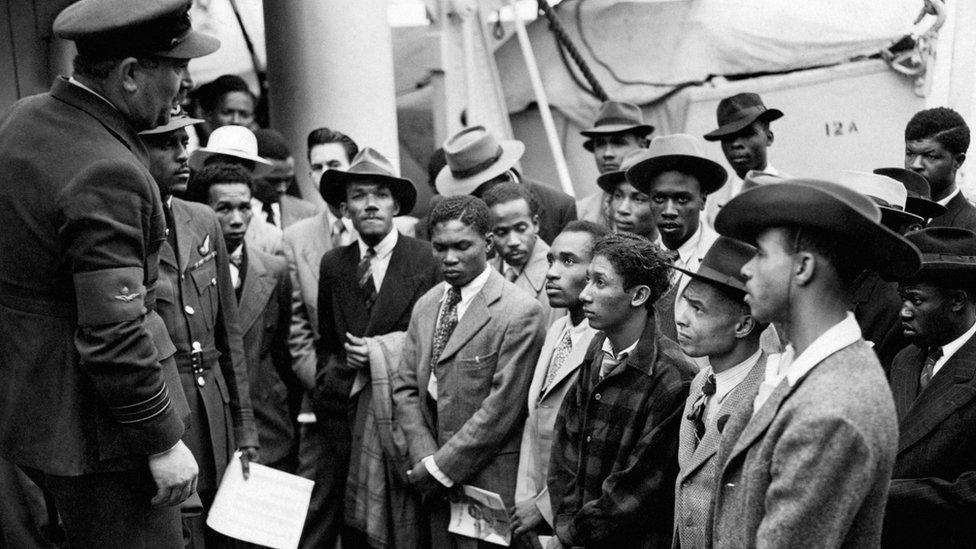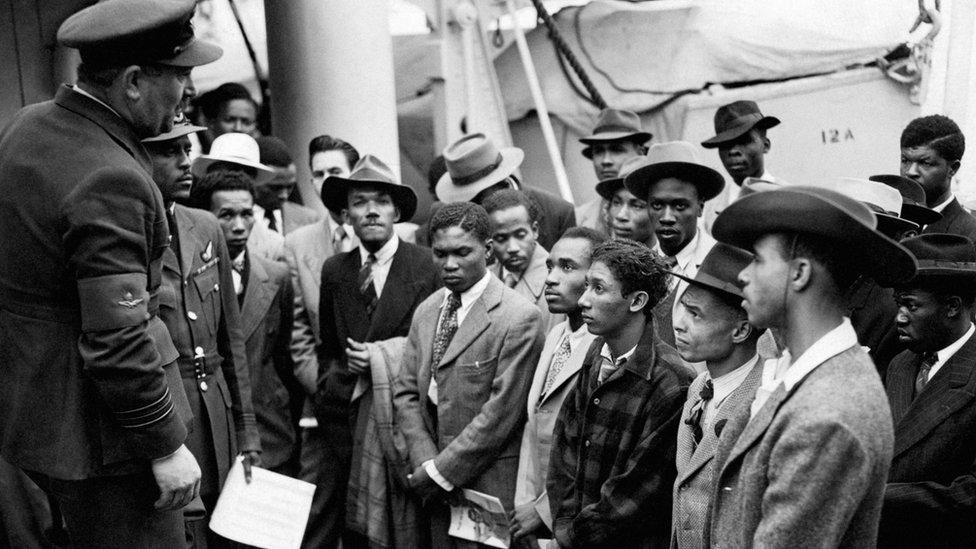Windrush scandal: Anger at Home Office over compensation progress
- Published

A report finds there are deep-rooted concerns over the Windrush compensation scheme
A Windrush scandal victim has called for running of the compensation scheme to be taken away from the Home Office, after a report found there had been a lack of tangible progress.
The Lessons Learned review warned of deep-rooted concerns over the process, saying the Home Office was at "tipping point" and could face a fresh scandal.
Victim Glenda Caesar said the scheme should be run by another body.
The Home Office said progress had been made but there was more to do.
The compensation scheme was launched by the Home Office in April 2019 to offer payments to people, mainly from the Caribbean, who had come to the UK legally but did not have the documents to prove their right to remain.
In 2018, it emerged many had lost homes, jobs and access to welfare benefits and NHS services after being wrongly classed as illegal citizens under strict Home Office immigration policy - while some were wrongly detained and even deported.
The review had been looking at the progress made since the independent report by author Wendy Williams in 2020, which found the scandal was "avoidable" and victims were let down by "systemic operational failings" at the Home Office.
In the latest review, Ms Williams said she was "disappointed" with the progress made by the government, and called for a migrants' commissioner, better engagement with the public and a higher standard of training for staff.
Ms Williams and her team reviewed more than 3,000 documents and spoke to hundreds of people.
Ms Caesar, who was denied the right to work for nearly a decade, said: "We have got people out in the community who are still waiting to get payments and it's very difficult with the helpline...
"Us as a community and grassroots organisations have given them [Home Office] so many ideas for them to improve the system, but it doesn't seem to be working."
The mother, who came to the UK as baby, lost her job as an NHS administrator in 2009 and faced deportation.
She added: "We are being pushed to the bottom of the line again."
Glenda Caesar explained her how life was affected by the Windrush scandal
Others say that the compensation they have been offered is "insulting".
Fitzroy Maynard came to the UK from Antigua. Despite living in London for most of his life, between the years of 2009-2018 he was unable to work or claim benefits, which left him homeless.
Mr Maynard said the compensation he has been offered - £40,000 minus £10,000 he has already received - was "very insulting" as it was based on a technicality and said he did not accept what he had been put through.
"The trauma doesn't disappear, it will always stay with you," he said.
"They [the Home Office] don't want to take any blame - they want to put all the blame on me."
Watch Fitzroy's moving account of becoming homeless after being wrongly declared an illegal immigrant
A Home Office spokesperson said: "We are committed to righting the wrongs of the Windrush generation which is why we work closely with each claimant to ensure they receive the maximum compensation they deserve."
The review said the Home Office had made progress in some areas, including its outreach programme and in forming a strategic race board.
Home Secretary Priti Patel said there had been a radical change and a "total transformation of culture" at the department.
She said: "We have already made significant progress and Wendy highlights many achievements, including the work we have put into becoming a more compassionate and open organisation.
"Having said that, there is more to do and I will not falter in my commitment to everyone who was affected by the Windrush scandal."
There has been long-running criticism of the Windrush Compensation Scheme by victims, their families and campaigners who say the process has taken too long and applications are too complicated.
The government said more than £37m been paid to almost 1,000 people since the scheme was set up.

IS THIS WHY YOU AREN'T GETTING THE JOB?: The new world of computer-automated recruitment
VIOLENCE, INTIMIDATION AND FEAR: The 'county lines' drug networks infiltrating rural areas

- Published24 November 2021

- Published21 May 2021

- Published22 June 2020

- Published19 March 2020

- Published21 June 2019

